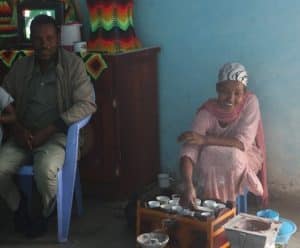Changing attitudes and examining gender roles are what the Gender Model Family (GMF) is all about.
For Asmamaw Getachew and Tigist Tadese, joining the Gender Model Family (GMF) approach through the 4R Nutrient Stewardship Project (4R-NSP) in Ethiopia a year and half ago challenged their attitudes towards gender roles and relationships. However, after GMF training, they really understood how to better support and care for each other. 
Before the training, Asmamaw said that men assign specific roles to women. Further, he was not willing to participate in household work because he thought it was meant for women. Moreover, when he returned home after field work, he thought he was the only one who was working and considered his wife jobless, which meant he didn’t help with household work.
After taking part in the training, Asmamaw and Tigist could better understand the amount of work each contributes to the household, including unpaid work. They started supporting each other both in the field and sharing household work. Asmamaw stated they have seen significant change in their lives and way of life.
“Because of the training, I started cleaning the house, support in cooking, making coffee, etc. My wife also started supporting in the field work. Therefore, both of us started to support each other in the work that we were not engaged in before the training. This brought a significant change in our lives,” Asmamaw said.
When describing their experiences, Asmamaw said,
“when I was cleaning a barn someone came in and laughed at me. He said, ‘how dare you clean a barn which is the work of a woman?’ And I told him we are trained to support each other in both household and field work and that positively impacted our way of life. Hence, I clean not only the barn, but also prepare the animals’ waste for fuel and then it can be exchanged with animals’ food with people who make local alcohols like ‘Areke.’ If I consider cleaning the barn as a work of a woman and leave it, the hens will damage the animals’ waste and we cannot get its benefits. Supporting each other in every work helps to share the burden and saves money. If you start to support your wife, the primary benefit will be to yourself. We also support each other in fattening animals for sale and that brought great change in our lives and finances. We bought three oxen for $1,560 CAD and after fattening them, we sold them for more than $3,120 CAD. Then we also sold our camel and some crops and used the money to purchase land to build a house in Arerti town. We did that because of mutual consensus and that is the result of the training. The greatest benefit of the project in our lives is it adds to our value of caring for each other. There are many families that really need change in their attitudes. Therefore, I suggest continuation of the training for those not yet trained and support them to bring positive change in their lives the same way it does in our lives.”
Similarly, his wife Tigist states, there was no mutual consensus over their finances before the GMF training. Both used to sell/buy things on their own without consulting each other and that affected their home greatly.
“He used to say it is not your business when I asked him about financial issues. But after the training, he stopped saying that and we started consulting each other and reaching mutual consensus in many matters including finance. All this attitudinal and practical changes are the result of the training. Moreover, previously he just washes his hands and waits for me to serve him with food. But now he has started supporting in the preparation and serves himself instead of waiting,” she said.
Tigist explained they learned a lot from the training. They also shared experiences with other Gender Model Families. Now, women can attend meetings in Co-operatives, Savings, and other gatherings whereas before they were limited to domestic spaces. As a result of their training and refresher, they are aware of the concepts of gender and gender roles and started teaching their neighbours as well. The change in their lives is positively impacting their neighbours too.
Gender Model Family
As part of CDF Canada’s approaches towards gender transformation, the Gender Model Family (GMF) approach is incorporated to address gender inequalities at both the household and community levels by promoting equitable division of unpaid work. It begins with training on basic gender concepts to build an understanding of the unequal distribution of care work between men and women. After the initial training sessions on gender awareness, participants assess the division of domestic chores in their own household and compare the daily activity profiles of women and men. They then work together to devise a household action plan that assigns chores in a more equitable way. As both men and women contribute to household work, they have time to engage in other income-generating activities and have more free time to enjoy as a family. This involves a series of trainings and follow-up sessions.
To date, the approach has brought on positive outcomes for project participants, in terms of more gender-equitable family dynamics and overall community cohesiveness. Along with CDF Canada’s co-operative development approaches that create an enabling environment for Women’s Economic Empowerment, the GMF approach is fostering social transformations that allow women to develop their professional skills and excel as entrepreneurs, all with the help and support of their husbands and male family members.